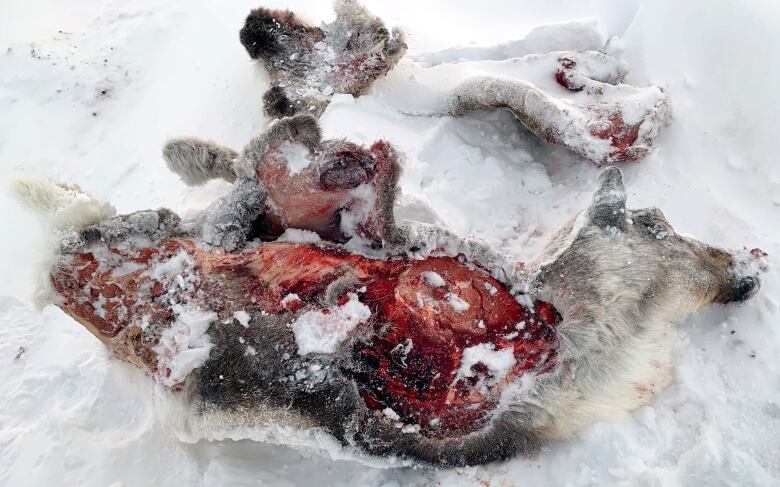'A big no-no,' says N.W.T. hunter after finding wasted caribou on the land
WARNING: This story contains graphic photos that some readers may find disturbing
A hunter in the N.W.T. is calling on others to be mindful about how much they harvest when they head out on the land.
Nathan Kogiak was hunting for wolves near the ice road to the Gahcho Kué mine site, where he goes every weekend to hunt. On Sunday, Kogiak said he saw a pile of caribou remnants near Reid Lake that he showed to N.W.T.'s Department of Environment and Natural Resources.
He then saw another pile of remnants near Lake of the Enemy the next day and reported that, too. Kogiak estimated seeing remnants of more than 30 caribou in each pile — gut piles which hunters typically leave behind — but within that he saw two carcasses full of good meat.
"[On one caribou] they just ... took the front legs hindquarters and then left the rest," he said.
"Growing up that was a big no-no that we're taught we don't do because we highly respect the caribou ...They sacrificed their life for us."
Kogiak said he thinks people are hunting more animals than they have time to process in the cold weather, so they start rushing.
If you need it, you take it.- Nathan Kogiak, hunter
"You can see all the meat there they left on the rump," he said. "They're cutting through good meat just to rip it off quick and get out of there."
"It was a huge harvest," he said. "When you have 30-plus caribou in one pile ... that's not a frequent number that goes through there."

Kogiak wants to see more restrictions on hunting, including for Indigenous hunters, because he doesn't think people are respectful enough of the animals.
"If you need it, you take it," he said.
Harvested caribou not illegal kind: government
Environment and Natural Resources spokesperson Joslyn Oosenbrug says there are three cases of meat wastage in the region — two at Reid Lake and one at Lake of the Enemy — under investigation, and that wastage is taken seriously.
Oosenbrug added that the caribou being harvested are not the Bathurst caribou, but members of the Beverly herd. Though both herds are listed as threatened, it is illegal to hunt the Bathurst herd because its numbers have declined more dramatically.
Over the past two winters, the 100,000-strong Beverly herd has been wintering near the Bathurst Caribou Management Zone, where no hunting is allowed. That means when the herd is outside the zone, hunters can harvest the caribou without impacting the struggling Bathurst herd.

"The harvest of Beverly caribou is not restricted, although wasting caribou is always illegal under the Wildlife Act, no matter which herd is harvested," Oosenbrug wrote in an email.
"Most caribou harvested at these lakes have been harvested legally and respectfully, using best practices."
Oosenbrug added that the number of meat wastage or illegal cases of harvesting has been relatively low in recent years compared to the total number of caribou available.
Illegal harvesting or meat wastage can be reported on the toll-free emergency line from anywhere in the N.W.T. at 1-866-762-2437.
Corrections
- A previous version of this story incorrectly stated Nathan Kogiak saw the first pile of caribou remnants on Feb. 1. In fact, it was March 1.Mar 06, 2020 10:28 AM CT
- A previous version of this story incorrectly stated the Bathurst caribou are endangered. In fact, they are listed as threatened.Mar 06, 2020 5:28 PM CT